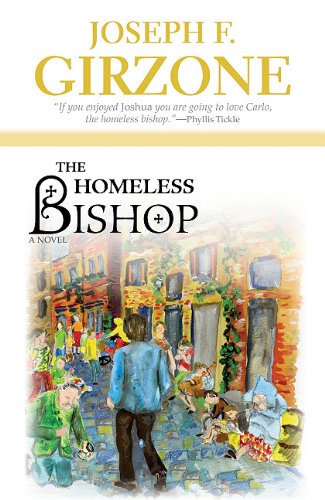 The Homeless Bishop
The Homeless Bishop
by Joseph F. Girzone
Orbis Books, July 2011
Hardcover, 304 pages
As a fan of Catholic fiction in all of its forms, I was very happy to have the recent opportunity to review a book by noted author and retired Catholic priest Joseph F. Girzone. If you're my age, you likely know this bestselling author through his well known "Joshua" series of books which have sold over three million copies and in many ways set the standard for religious fiction.
The Homeless Bishop is a wonderful novel with a few problems for observant and practicing Catholic readers. Let me begin my review by sharing with you what I loved about this book. First and foremost, I turn to fiction of any kind (including religious fiction) to be inspired and entertained. In this respect, The Homeless Bishop is a winner, filled with characters you quickly come to know and love and a plot line that will keep you wanting to read straight through to the end.
Bishop Carlo Brunini, for whom The Homeless Bishop is named, is an accomplished young Italian priest rising along the fast-track to advancement within a Church he loves with all his heart. Bishop Brunini makes a deliberate choice to ask for permission to place his public ministry on hold and moves half a world away to the United States, adopting the lifestyle of a homeless man with nothing but the clothing on his body. The life lessons he learns living among the homeless change not only the bishop's attitude about serving the poor, but in many ways truly revolutionize his understanding of the truths of the Gospel message. But The Homeless Bishop extends beyond Carlo's life among the homeless and we see him return to his diocese, be tapped for a pivotal diplomatic role in Iran, and ultimately rise to the highest levels of the Church hierarchy.
The Homeless Bishop is the type of book that can truly change one's perspective on life. Like many of you, I live in a community with a rising homeless population and my experience of reading this book has truly and radically changed my perspective about (and my treatment of) my homeless neighbors. Without being sticky sweet or overly dramatic, The Homeless Bishop is a tremendous vehicle for putting a human face on a problem that seemingly has few solutions. My reading of this book leaves me more convicted than ever about the fact that finding an answer to poverty, to the suffering of families in my community, and to the depersonalization of the poor is my problem, our problem and not something to which I can continue to turn a blind eye.
So yes, this is a book that is entertaining, inspirational and also a book which has the potential to change hearts and minds.
As a Catholic reading The Homeless Bishop, I will say however that it is not without a few problems. Before writing this review, I consulted a trusted priest advisor who I know to be a very Holy priest, so my concerns here are shared in the context of that consultation. Let me say first that I found The Homeless Bishop to be very respectful of the institutional Church. The Pope is portrayed in a very positive light and even though "Church politics" are exposed, the tone of the book is very positive towards the Catholic Church. My problem, as a practicing Catholic who does her best to follow the true teachings of the Church, is with a few of the lifestyle choices of the main character, Bishop Carlo Brunini. Upon his return from his time living among the homeless, Carlo makes the choice to adopt a family of eight homeless children. Because he obviously cannot meet the needs of the children on his own, he requests the help of his devoted first cousin Madalena, who moves into the home (in separate sleeping quarters) with Carlo and the children and truly becomes their mother. The personal relationship between Carlo and Madalena is always proper, but there is no doubt that a deep and abiding love exists between the cousins, who choose to live chastely and to co-parent the children into adulthood. Again, I underscore that no physical relationship or any inappropriate behavior ever occurs between the two, but the author does toward the end of the book raise discussion on the topic of married priests as a potential future development in the Catholic Church.
None of us knows whether this will indeed be a future development in the Church, but given today's teachings I did find discomfort with the "familial" feeling of Carlo's living arrangements with the children. Again, this is fiction and an author always has the choice to tell his story as he sees fit. I'll simply say that for me as a fiction fan and also one who tries to uphold the true teachings of the Church, I would have loved to see Carlo's story unfold without these issues related to adoption of children and the future of married priests in our Church.
This being said, I definitely loved my experience of reading The Homeless Bishop and would strongly recommend it for anyone seeking inspirational fiction with a strong social message. Be prepared to have your perspective shifted about some of your deeply held assumptions, strive to understand the true teachings of our Church, and enjoy getting to know The Homeless Bishop.
Order The Homeless Bishop and Support CatholicMom.com with your purchase.
About the Author

Lisa M. Hendey
Lisa M. Hendey is the founder of CatholicMom.com, a bestselling author and an international speaker. A frequent radio and television guest, Hendey travels internationally giving workshops on faith, family, and communications. Visit Lisa at LisaHendey.com, on her Substack at LisaHendey.Substack.com, or on social media @LisaHendey for information on her speaking schedule or to invite her to visit your group, parish, school or organization. Find Lisa’s books on her Amazon author page.


.png?width=1806&height=731&name=CatholicMom_hcfm_logo1_pos_871c_2728c%20(002).png)
Comments